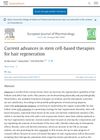 January 2014 in “International Journal of Athletic Therapy and training”
January 2014 in “International Journal of Athletic Therapy and training” A female runner's hair loss was caused by stress from surgery and recovery, but her hair returned to normal in 5 months.
 September 2003 in “Journal of the Royal Society of Medicine”
September 2003 in “Journal of the Royal Society of Medicine” The document concludes that while some advocate for a patient voucher system, it may be unequal and current healthcare reforms should be given a chance, and it also recommends various medical books for their comprehensive coverage and advice on specific health issues.
 October 1997 in “Baylor University Medical Center Proceedings”
October 1997 in “Baylor University Medical Center Proceedings” Obesity in the U.S. is largely influenced by diet and exercise, certain medications can improve heart procedures and hair growth, and major teaching hospitals have better patient outcomes.
[object Object]  May 2020 in “Journal of Asian Medical Students' Association”
May 2020 in “Journal of Asian Medical Students' Association” Hair loss severity is linked to depression, not anxiety, in Filipino men, with older, less educated men with more hair loss at higher risk.
 2 citations,
March 2001 in “Environmental Health Perspectives”
2 citations,
March 2001 in “Environmental Health Perspectives” Small hormonal imbalances can cause significant health problems, so more sensitive testing for hormone-disrupting chemicals is needed.
 April 2023 in “Research Square (Research Square)”
April 2023 in “Research Square (Research Square)” Many healthcare workers who had Covid-19 suffer from long-term symptoms like hair loss and fatigue, especially women.
 January 2012 in “Human health handbooks”
January 2012 in “Human health handbooks” Low-level light therapy is FDA-approved for male pattern hair loss, increases hair count and strength, and is considered safe for use.
 32 citations,
May 2020 in “European Journal of Pharmacology”
32 citations,
May 2020 in “European Journal of Pharmacology” Stem cell therapies show promise for hair regrowth but face production and application challenges.
 March 2024 in “Journal of Cosmetic Dermatology”
March 2024 in “Journal of Cosmetic Dermatology” Laser-pretreated blood for hair loss treatment was more effective and increased stem cells.
 May 2023 in “Advances in medicine”
May 2023 in “Advances in medicine” Alopecia areata significantly impacts patients' mental health and quality of life.
162 citations,
October 2014 in “Autoimmunity reviews” Alopecia areata is caused by the immune system attacking hair follicles.
11 citations,
January 2018 in “International Journal of Trichology” The true incidence of post-Finasteride syndrome is unclear, and more research is needed.
 7 citations,
December 2021 in “Pharmaceutics”
7 citations,
December 2021 in “Pharmaceutics” Natural products like plant extracts can help promote hair growth and could be used to treat hair loss.
 1 citations,
February 2022 in “Biological Trace Element Research”
1 citations,
February 2022 in “Biological Trace Element Research” The combination of Arginine Silicate Inositol Complex and a new form of Biotin improved hair and nail growth in rats.
 September 2023 in “JPRAS Open”
September 2023 in “JPRAS Open” Botulinum Toxin A may help with hair growth and has some side effects; more research is needed.
 June 2022 in “Research, Society and Development”
June 2022 in “Research, Society and Development” COVID-19 may cause increased hair loss, but the exact reason is unclear and standard hair loss treatments are recommended.
October 2022 in “Journal of Drugs in Dermatology” Combining PRP and laser treatments improves hair density best for androgenetic alopecia.
September 2022 in “Dermatology and therapy” Androgenetic alopecia is linked to heart disease, metabolic issues, and mental health problems.
 9 citations,
January 2020 in “Postepy Dermatologii I Alergologii”
9 citations,
January 2020 in “Postepy Dermatologii I Alergologii” Frontal fibrosing alopecia is a poorly understood condition with increasing cases and unclear treatment effectiveness.
7 citations,
March 2022 in “Journal of the American Academy of Dermatology” Stress can trigger or worsen alopecia areata.
 2 citations,
July 2023 in “Frontiers in Endocrinology”
2 citations,
July 2023 in “Frontiers in Endocrinology” The review found that current care models for PCOS are not fully effective and more research is needed, especially in low-income countries.
1 citations,
January 2022 in “Dermatology Research and Practice” Androgenetic alopecia negatively affects self-esteem and daily stress, especially in young men.
 October 2022 in “Journal of ophthalmology”
October 2022 in “Journal of ophthalmology” Light therapy may improve eye conditions by stimulating cell activity and increasing oxygen availability.
 4 citations,
October 2022 in “Genes”
4 citations,
October 2022 in “Genes” Our microbiome may affect the development of the hair loss condition Alopecia Areata, but more research is needed to understand this relationship.
 1 citations,
May 2023 in “Frontiers in Endocrinology”
1 citations,
May 2023 in “Frontiers in Endocrinology” Autism's genetics are linked with early age of puberty and less hair loss, but not with hormone levels or polycystic ovary syndrome.
50 citations,
January 2016 in “Journal of the American Academy of Dermatology” Pulse steroid therapy for alopecia areata shows a 43% complete response rate but has a high relapse rate, especially in children.

Combining stress management and Minoxidil helps treat stress-related hair loss and improve well-being.
 40 citations,
May 2020 in “Cureus”
40 citations,
May 2020 in “Cureus” The conclusion is that treatments for Telogen Effluvium exist, but standard treatment guidelines are needed.
[object Object]  2 citations,
January 2023 in “Pharmaceuticals”
2 citations,
January 2023 in “Pharmaceuticals” Natural products and phytochemicals may help with hair regrowth, but more research is needed.
51 citations,
December 2017 in “Skin Appendage Disorders” Stress may trigger hair loss by affecting immune protection in hair follicles.






















